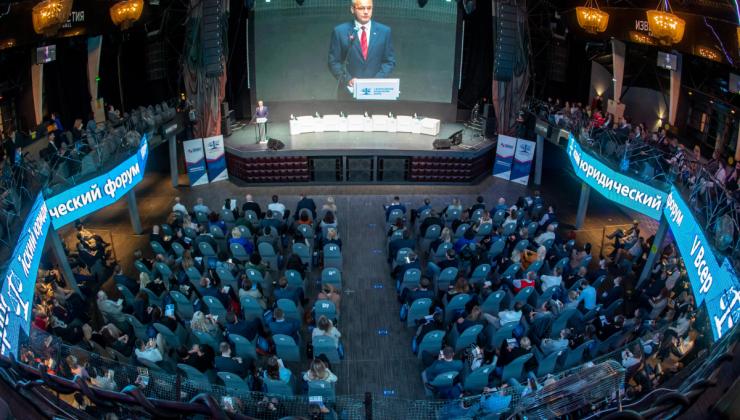
The V All-Russia Legal Forum-Civil Legislation Reform Held in Moscow
The V All-Russia Legal Forum - Civil Legislation Reform: Legal Regulation of Corporate, Obligation and Real Legal Relations traditionally organised by Garant was held on the 22nd of September at the Izvestiya Hall in Moscow.
Photo by: Alexander Kuzmin
Due to pandemic restrictions the Izvestiya Hall could not allow access for meeting in person Russia's renown law scholars for all who wanted to, so the majority of participants watched it on-line. The forum became one of the most significant events for lawyers from all parts of Russia since it dealt with the most acute and complicated problems of the Russian civil law, and it set a record in terms of participants, over 20,000 this year!
Photo by: Alexander Kuzmin
In his opening speech Dmitry V. Persheyev, Chairman of Garant's Board of Directors described the legislation fluidity shown not only by the number of adopted acts but also by the normative techniques the legislature uses, as evidenced by figures. He graphically demonstrated the variability of the country's basic codes. Thus, Russia's Tax Code is modified on the average once in a fortnight, and the Code of Administrative Offences, once in 10 days. Also mentioned was the "regulatory guillotine" announced three years ago, with its benefits and drawbacks, led to repealing about 20,000 normative acts, truly not a small number, but as compared with roughly 200,000,000 data storage units available in the Garant System it constitutes 0.01%, not much at all in relation to the entire corpus of legislation. The Russian legislation's complexity is growing from year to year.
For instance, a typical law for the last 25 years has become two and a half times longer, and its typical article, three times. The composite readability index on the average has grown up one and a half times.
Pavel V. Krasheninnikov, Chairman, Committee for State Building and Legislation of the State Duma of the Russian Federation dwelt on several topics, he said: "First, we have completed the reform of inheritance law, in 2017 amendments on formation of posthumous inheritance foundations were adopted, in 2018 amendments on the joint will and inheritance contracts. Recently, amendments were adopted concerning the inheriting of personal foundations, they are not yet put in force, and are going, first of all, to help owners of businesses. After adopting amendments to the Fundamental Law we also made amendments to Russia's Civil Code with regard to the relation between international treaties and federal laws. For the nearest future we intend tackling rights in rem, and are going to reach a good level".
Photo by: Alexander Kuzmin
The forum's first block, "Corporate Law after the 2014 Reform of the Civil Code of the Russian Federation", was conducted by Yevgeny A. Sukhanov, Head, Chair of Civil Law, Faculty of Law, M.V.Lomonosov Moscow State University, Deputy Chairman of the Council for Codification and Improvement of Civil Legislation under the President of the Russian Federation. He pointed out that participants managed to attend despite coronavirus restrictions, and it was no coincidence that the event started from the corporate law since there existed a contradiction between the Civil Code and special laws.
The round table meeting was attended by Andrey V. Gabov, Chief Research Fellow, Institute of the State and Law of the Russian Academy of Sciences, Associate Member of the Russian Academy of Sciences; Aleksandr A. Kuznetsov, Head of the Corporate Disputes Team of Pepelyayev Group; Dmitry V. Lomakin, Professor, Chair of Civil Law, Faculty of Law, M.V.Lomonosov Moscow State University, member of the Scientific Consultative Council under the Supreme Court of the Russian Federation. Aleksandra A. Makovskaya, Judge Emeritus, Higher Arbitration Court of the Russian Federation, lecturer of the Faculty of Law, M.V.Lomonosov Moscow State University substantiated why only a single law on business undertakings can become an instrument for resolving problems which have piled up in the corporate law. Irina S. Shitkina, Professor, Chair of Business Law, head of the master's programme "Corporate Law" of the Faculty of Law, M.V.Lomonosov Moscow State University dwelt on the problems occurring in cases when a multiple sole executive body heads an organisation, inciting a live response by participants.
Photo by: Alexander Kuzmin
While summarising the work done, Yevgeny A. Sukhanov said that a whole day would not be sufficient for all to say and ask what they would want to, and thanked participants for the fruitful discussion.
The second block "Problems of Application of Rules Concerning Methods of Securing the Discharge of Civil-Law Obligations" was opened by Vassily V. Vitryansky, Deputy Chairman Emeritus, Higher Arbitration Court of the Russian Federation, member of the Council for Codification and Improvement of Civil Legislation under the President of the Russian Federation. He said he was glad to see off-line the faces of people who are interested and are professionals, while due to the pandemic they had to speak before television cameras before, so accordingly it was quite a festive occasion to meet in person.
Issues of that block were discussed by Roman S. Bevzenko, partner, Pepelyayev Group who expressed an interesting opinion on the merger of independent guarantee and suretyship norms); Artiyom G. Karapetov, Professor, Higher School of Economics under the Government of the Russian Federation, Director, Institute of Law "M-Logos" who dwelt in detail on the financial collateral; Aleksandra A. Makovskaya, Partner, Legal Firm "Sinum ADV", and Yevgeny D. Suvorov, Lecturer, Chair of Civil Law, O.E.Kutafin Moscow State University of Law.
Photo by: Alexander Kuzmin
The third block, "Today's Problems of Legal Regulation of Real Estate" started its work as chaired by Vassili V. Vitryansky who drew attention to specifics of the legal regime of certain immovable property items, save the land plot. A report entitled "The Notion and Features of Real Estate. Current Concept" was delivered by Yevgeny A. Sukhanov. Roman S. Bevzenko tackled issues of rights in rem as pertaining to the land plot; Ilya B. Mironov, Head of Staff of the Committee for State Building and Legislation of the State Duma of the Federal Assembly of the Russian Federation spoke about new developments in the sphere of state registration of rights to immovable property and the "garage amnesty"; and Konstantin A. Korsik, President, Federal Chamber of Notaries, President, Moscow City Chamber of Notaries spoke about the notary's role in formalising and realising transactions in immovable properties.
After each block the participants had an opportunity for putting questions to the lecturers. Prizes from the organisers and partners of the forum went to the authors of the best questions.
Many words of gratitude were received from participants as addressed to the organisers and the speakers of the event, for instance:
"Great forum, wonderful! Thanks!", a_pettrenko
"Thanks a lot for organisation and opportunity for attending in person", maslennikova8766
"Very interesting forum! All very well planned and organised. Many enlightened people able to provide important and useful information!", Aleksandr Shchupachkin
"Due to some circumstances participated in on-line mode. Next year I am going by all means to attend in person. Very much liked the reports of speakers, especially R.S.Bevzenko", Inna Chernikova
"Remarkable organisation, useful information! Participated on-line. Next time will try to attend in person" Olesya Meleshkina
"Useful and up-to-date information. Interesting dialogues and explanations by leading lawyers. Thanks! Until next forum!", Natalya
"Excellent event, many thanks to Garant for organising the event, and to all today's speakers!", advocatus_dei
"My gratitude to you for relevance of the topics chosen, and special gratitude for the speakers of the second and third blocks! It is a storehouse of information. Could not stop listening!", klimova.prava
"Thanks a lot for top-level organisation of such forum! Well done, Garant!", legal_cimmer
 Call us
Call us
 Write to us
Write to us

